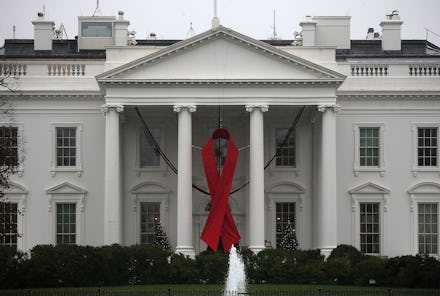AIDS deaths are almost half of what they were in 2005 — but experts worry Trump could reverse that

A new report from the United Nations shows promising progress in treating the global HIV/AIDS crisis, but some experts worry President Donald Trump’s policy proposals might turn the trend right back around.
The report, released Thursday, found that approximately 53% of the 36.7 million people living with HIV globally in 2016 had access to life-saving treatments. This is up substantially from 2005, when only 7% of those living with HIV received antiretroviral therapy, according to the World Health Organization.
In addition, the report said the number of AIDS-related deaths dropped from 1.9 million in 2005 to 1 million in 2016 — reducing the death toll by nearly half in the span of 11 years.
While these numbers demonstrate significant progress in the effort to combat HIV/AIDS, Mitchell Warren, executive director of HIV-prevention advocacy group AVAC, told Mic he worries that Trump’s proposed budget cuts could put the epidemic back in peril.
“If the president’s budget were enacted, we would see the progress that has been gained over the last decade reversed very quickly, and all of the hard-fought gains reversed almost quicker than we achieved them,” Warren said in a phone call Thursday.
How Trump’s proposed budget cuts could affect the HIV crisis
If passed, Trump’s budget would slash funding for the President’s Emergency Plan for AIDS Relief — known as PEPFAR — by 17%, according to NPR. Since its 2003 launch by former President George W. Bush, PEPFAR has provided HIV treatment to approximately 11.5 million people worldwide. Warren said the program is one of the main “drivers of the success” demonstrated by the U.N.’s report.
Additionally, Trump’s proposed budget includes a $222-million cut to the Global Fund to Fight AIDS, Tuberculosis and Malaria, as well as a $627-billion bite from Medicaid. More than 40% of the roughly 1.1 million people living with HIV in the United States currently receive care through Medicaid, according to the Kaiser Family Foundation.
Warren said cuts to these programs and institutions would be “disastrous” for the HIV/AIDS crisis, both domestically and internationally.
Trump’s potential budget also reduces the United States’ contributions to the U.N. by 31%, ABC News reported. Sophie Harman, a senior lecturer in global health politics at London’s Queen Mary University, told ABC News that some countries may not be able to afford U.N.-funded HIV/AIDS programs without this financial assistance.
“The real test will come in 5 to 10 years, once the funding goes down,” Harman said.
Repealing the Affordable Care Act could also pose problems
Warren fears how the potential repeal of former President Barack Obama’s signature health care legislation could impact the HIV crisis.
According to the Advocate, wiping out the Affordable Care Act could strip health care from tens of thousands of people with HIV/AIDS, as well as bar millions from receiving free HIV testing. A repeal could also remove access to Medicaid from low-income people living with the virus, the Advocate reported.
“The Affordable Care Act has actually been incredibly important in helping even more people access care, treatment and prevention with respect to HIV,” Warren said. “Repealing Obamacare would have a dramatic effect, and none of the replacement options come close to doing what the ACA does.”
Former Presidential Advisory Council on HIV/AIDS member Lucy Bradley-Springer expressed similar concerns in a June interview with Mic, shortly after she resigned from the board due to Trump’s apathy regarding the epidemic.
“A lot of people living with HIV depend on having access to care,” Bradley-Springer said. “If they don’t have access to care, they don’t get the care they need, and then they also are more likely to transmit the infection to other people.”
In addition to these potentially harmful cuts and health care proposals, Trump has still not appointed anyone to lead the Office of National AIDS Policy, and the department’s webpage was removed from the White House’s official site the day he was inaugurated, according to Newsweek.
The Office of National AIDS Policy was created in 1993 by Bill Clinton and remained intact throughout George W. Bush and Barack Obama’s presidencies — with bipartisan support, as Warren pointed out. Under these prior administrations, the department worked to reduce the number of HIV infections across the country by treating those living with the virus and providing educational programs on prevention.
“To not appoint someone in that role sends the message of either ‘I don’t care,’ or ‘I don’t understand,’” Warren said. “And either of those responses is wrong.”
Despite Trump’s lack of action regarding the epidemic, Warren said he remains hopeful that both Democrats and Republicans in Congress will band together to make sure HIV/AIDS remains a top priority in Trump’s White House.
“The evidence is clear: HIV treatment is hugely beneficial for people who are infected, and HIV prevention is essential to reduce the numbers of new infections,” Warren said. “We hope that members of Congress will react appropriately, and most importantly, ignore the politics and follow the evidence.”